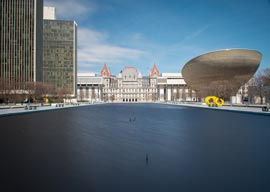
February 19, 2015

New York State Plaza, Albany
Source: Shutterstock
An African politician who does not enrich himself in office is actually considered morally defective. In Modern Times, Paul Johnson quotes Kenyan President Jomo Kenyatta mocking an idealistic opponent for failing to milk his position:
If you go to Kubai’s home, he has a big house and a nice shamba [plantation]. Kaggia, what have you done for yourself? We were together with Kungu Karumba in gaol. Now he is running his own buses. What have you done for yourself?
Harry Truman left office flat broke. He had to take out a bank loan to write his memoirs. Most of the world’s politicians would call him a fool.
And let’s not get all white supremacist here”heaven forbid! The recent electoral triumph of wacky-left party Syriza in Greece was partly a reaction against sensational levels of corruption; and no one in China or Africa has anything to teach the Russians”or for that matter the Ukrainians“about the opportunities of high office.
It hasn”t been just the Orthodox zone, either. Orwell, writing in the 1940s, noted that: “In the France of the Third Republic all but a very few of the newspapers could notoriously be bought over the counter like so many pounds of cheese.” And it was a British prime minister, Sir Robert Walpole, who observed of his parliamentary colleagues that: “All those men have their price.”
The Corruption Perceptions Index suggests that if you want clean government, you had better live in a country inhabited or settled by Northwest Europeans. Even that, while a necessary condition, is not a sufficient one, as Sheldon Silver and Sir Robert Walpole show.
It’s a fallen world, all right, and those occasional spells of clean government in Northwest-European democracies have been anomalies. Down through the ages, from the very beginnings of civilized life, echoes the customary greeting of the corrupt office-holder: “Who sent you?”